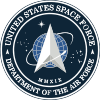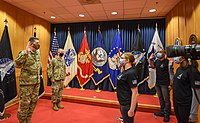United States Space Force
The United States Space Force (USSF) is the space service branch of the United States Armed Forces. Along with the Air Force, it is part of the Department of the Air Force, led by the secretary of the Air Force.[8] Its military heads are the chief of space operations, who is one of the Joint Chiefs of Staff, and the vice chief of space operations.
"Semper Supra" redirects here. For the official march of the United States Space Force, see Semper Supra (march).United States Space Force
20 December 2019
- Semper Supra
- "Always above"[5]
20 December
- Grenada – Operation Urgent Fury
- Lebanese Civil War
- Libya – Operation El Dorado Canyon
- Persian Gulf – Operation Ernest Will
- Panama – Operation Just Cause
- Somalia – Operation United Shield
- Haiti – Operation Uphold Democracy
- Bosnia and Herzegovina & Croatia – Operation Joint Endeavor
- Bosnia and Herzegovina & Croatia – Operation Joint Guard
- Bosnia and Herzegovina & Croatia – Operation Joint Endeavor
- Bosnia and Herzegovina & Croatia – Operation Joint Forge
- Southwest Asia – Operation Vigilant Sentinel
- Southwest Asia – Maritime Intercept Operations
- Southwest Asia – Operation Southern Watch
- Southwest Asia – Operation Northern Watch
- Southwest Asia – Operation Desert Fox
- Haiti – Operation Secure Tomorrow
- Persian Gulf War
- Kosovo Air Campaign
- Kosovo Defense Campaign

- Iraq Campaign[7]
As U.S. Space Force
![]() Gen Michael Guetlein
Gen Michael Guetlein
The Space Force is the smallest U.S. armed service, consisting of 8,600 military personnel.[1] It operates 77 spacecraft in total across various programs such as GPS, Space Fence, military satellite communications constellations, X-37B spaceplanes, U.S. missile warning system, U.S. space surveillance network, and the Satellite Control Network. Under the Goldwater–Nichols Act, the Space Force is responsible for organizing, training, and equipping space forces, which are then presented to the unified combatant commands, predominantly to United States Space Command, for operational employment.
The U.S. Space Force traces its roots to the beginning of the Cold War, with the first military space programs starting in 1945. In 1954, the Air Force established the Western Development Division, the world's first dedicated space organization, under General Bernard Schriever and unified its space forces under Air Force Space Command in 1982. U.S. space forces have participated in every U.S. conflict since the Vietnam War, most notably in the Persian Gulf War, often referred to as the first "space war".
The first discussion of a U.S. Space Force occurred under President Dwight Eisenhower's administration in 1958 and it was nearly established in 1982 by President Ronald Reagan as part of the Strategic Defense Initiative. The 2001 Space Commission argued for the creation of a Space Corps around 2007–2011, but due to the September 11 attacks and war on terror any plans were put on hold. In 2017, Representatives Jim Cooper and Mike Rogers' proposal for a Space Corps passed the House but failed in the Senate. In 2019, the House and Senate resolved their differences to pass the United States Space Force Act. It was signed into law by President Donald Trump, establishing the U.S. Space Force as the first new independent military service since the Army Air Forces were reorganized as the U.S. Air Force in 1947.[9]





